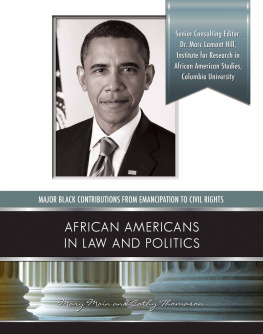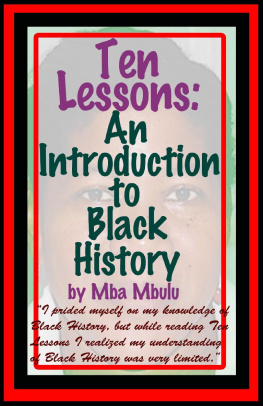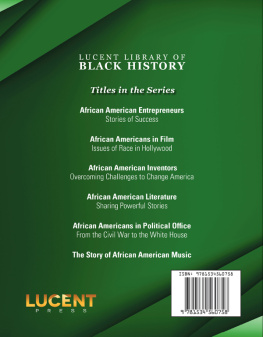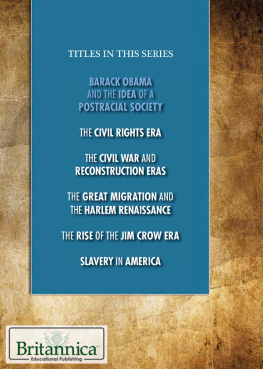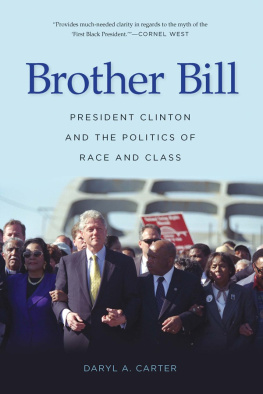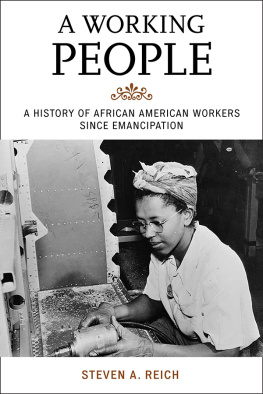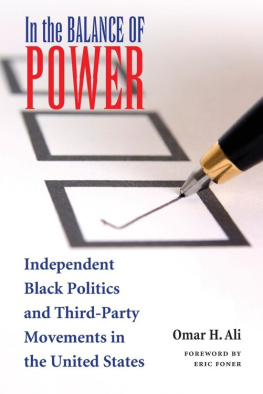
AFRICAN AMERICANS
IN LAW
AND POLITICS
MARY MAIN AND CATHY THOMASON
TITLES IN THIS SERIES
AFRICANAFRICAN-AMERICAN ACTIVISTS
AFRICAN-AMERICAN ARTISTS
AFRICAN-AMERICAN EDUCATORS
AFRICAN-AMERICAN MUSICIANS
AFRICANAFRICAN-AMERICAN SCIENTISTS AND INVENTORS
AFRICAN-AMERICAN WRITERS AND JOURNALISTS
AFRICAN AMERICANS IN BUSINESS
AFRICAN AMERICANS IN LAW AND POLITICS
AFRICAN AMERICANS IN THE MILITARY
AFRICAN AMERICANS IN RADIO, FILM, AND TV ENTERTAINMENT
AFRICAN AMERICANS IN SPORTS
A HISTORY OF THE CIVIL RIGHTS MOVEMENT
AFRICAN AMERICANS
IN LAW AND POLITICS

MARY MAIN AND CATHY THOMASON

MASON CREST
PHILADELPHIA
 | Mason Crest
370 Reed Road, Suite 302
Broomall, PA 19008
www.MasonCrest.com |
Copyright 2013 by Mason Crest, an imprint of National Highlights, Inc.
All rights reserved. No part of this publication may be reproduced or transmitted in any form or by any means, electronic or mechanical, including photocopying, recording, taping, or any information storage and retrieval system, without permission from the publisher.
Printed and bound in the United States of America.
CPSIA Compliance Information: Batch #MBC2012-8. For further information, contact Mason Crest at 1-866-MCP-Book.
First printing
1 3 5 7 9 8 6 4 2
Library of Congress Cataloging-in-Publication Data
Main, Mary, 1944
African Americans in law and politics / Mary Main and Cathy Thomason.
p. cm. (Major Black contributions from emancipation to civil rights)
Includes bibliographical references and index.
ISBN 978-1-4222-2378-9 (hc) ISBN 978-1-4222-2391-8 (pb)
1. African AmericansHistory19th centuryJuvenile literature. 2. African AmericansHistory20th centuryJuvenile literature. 3. African American politiciansHistoryJuvenile literature. 4. African American lawyersHistoryJuvenile literature. 5. African American politiciansBiographyJuvenile literature. 6. African American lawyersBiographyJuvenile literature. 7. United States Race relationsHistoryJuvenile literature. 8. Civil rights movementsUnited StatesHistoryJuvenile literature. I. Thomason, Cathy. II. Title.
E185.2.M36 2012
973'.0496073dc23
2011051947
Publishers note: All quotations in this book are taken from original sources, and contain the spelling and grammatical inconsistencies of the original texts.
Picture credits: office of Congressman John Lewis: .
TABLE OF CONTENTS
by Dr. Marc Lamont Hill,
Institute for Research in African American Studies at Columbia University.

Dr. Marc Lamont Hill
I t is impossible to tell the story of America without telling the story of Black Americans. From the struggle to end slavery, all the way to the election of the first Black president, the Black experience has been a window into Americas own movement toward becoming a more perfect union. Through the tragedies and triumphs of Blacks in America, we gain a more full understanding of our collective history and a richer appreciation of our collective journey. This book series, MAJOR BLACK CONTRIBUTIONS FROM EMANCIPATION TO CIVIL RIGHTS,spotlights that journey by showing the many ways that Black Americans have been a central part of our nations development.
In this series, we are reminded that Blacks were not merely objects of history, swept up in the winds of social and political inevitability. Rather, since the end of legal slavery, Black men and women have actively fought for their own rights and freedoms. It is through their courageous efforts (along with the efforts of allies of all races) that Blacks are able to enjoy ever increasing levels of inclusion in American democracy. Through this series, we learn the names and stories of some of the most important contributors to our democracy.
But this series goes far beyond the story of slavery to freedom. The books in this series also demonstrate the various contributions of Black Americans to the nations social, cultural, technological, and intellectual growth. While these books provide new and deeper insights into the lives and stories of familiar figures like Martin Luther King, Michael Jordan, and Oprah Winfrey, they also introduce readers to the contributions of countless heroes who have often been pushed to the margins of history. In reading this series, we are able to see that Blacks have been key contributors across every field of human endeavor.
Although this is a series about Black Americans, it is important and necessary reading for everyone. While readers of color will find enormous purpose and pride in uncovering the history of their ancestors, these books should also create similar sentiments among readers of all races and ethnicities. By understanding the rich and deep history of Blacks, a group often ignored or marginalized in history, we are reminded that everyone has a story. Everyone has a contribution. Everyone matters.
The insights of these books are necessary for creating deeper, richer, and more inclusive classrooms. More importantly, they remind us of the power and possibility of individuals of all races, places, and traditions. Such insights not only allow us to understand the past, but to create a more beautiful future.


President Barack Obama delivers his inaugural address to an enormous crowd of people, estimated at more than 1.5 million, in Washington, D.C., January 20, 2009.
A t just after noon, Obama and his family stepped onto a podium in front of the U.S. Capitol building. Obamas wife Michelle and his daughters Malia and Sasha looked on as Supreme Court Justice John Roberts administered the presidential oath. The smiling presidentelect wore a dark suit, white shirt and red tie with an American flag pin in his lapel. President Obama swore his oath on the Bible used by President Abraham Lincoln in 1861. He promised to preserve, protect and defend the Constitution of the United States.
As the new president pronounced the final word of the oath, the crowd erupted in cheers for the first African American elected to the office: Obama! Obama! Obama! The waving, cheering crowd resembled a rainbow-colored sea flowing from the Washington Monument to the Capitol building.
Barack Obama was aware of the sacrifices of those who had gone before him in history. When the crowd finally settled down, Obama began to speak. He paid tribute to previous generations of Americans. The president emphasized that the United States is a country that honors the God-given promise that all are equal, all are free, and all deserve a chance to pursue their full measure of happiness.
Next page
